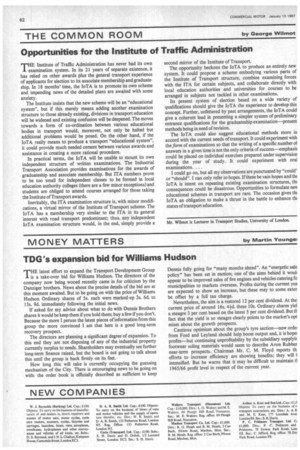Opportunities for the Institute of Traffic Administration
Page 64

If you've noticed an error in this article please click here to report it so we can fix it.
THE Institute of Traffic Administration has never had its own examination system. In its 21 years of separate existence, it has relied on other awards plus the general transport experience of applicants for election to its associate membership and graduateship. In 18 months' time, the IoTA is to promote its own scheme and impending news of the detailed plans are awaited with some anxiety.
The Institute insists that the new scheme will be an "educational system", but if this merely means adding another examination structure to those already existing, divisions in transport education will be widened and existing confusion will be deepened. The moves towards a form of co-ordination between various educational bodies in transport would, moreover, not only be halted but additional problems would be posed. On the other hand, if the IoTA really means to produce a transport "educational system", it could provide much needed cement between various awards and assistance in creating a more rational procedure.
In practical terms, the IoTA will be unable to mount its own independent structure of written examinations. The Industrial Transport Association provides examinations for the awards of graduateship and associate membership. But ITA numbers prove to be too small for independent classes to be formed in local education authority colleges (there are a few minor exceptions) and students are obliged to attend courses arranged for those taking the Institute of Transport awards.
Inevitably, the ITA examination structure is, with minor modifications, a virtual mirror of the Institute of Transport scheme. The IoTA has a membership very similar to the ITA in its general interest with road transport predominant; thus, any independent IoTA examination structure would, in the end, simply provide a second mirror of the Institute of Transport.
The opportunity beckons the IoTA to produce an entirely new system. It could propose a scheme embodying various parts of the Institute of Transport structure, combine examining forces with the ITA for certain subjects, and collaborate directly with local education authorities and universities for courses to be arranged in subjects not tackled in other examinations.
Its present system of election based on a wide variety of qualifications should give the IoTA the experience to develop this concept. Further, unfettered by past arrangements, the IoTA could give a coherent lead in presenting a simpler system of preliminary entrance qualifications for the graduateship examination—present methods being in need of revision.
The IoTA could also suggest educational methods more in accord with the current needs of transport. It could experiment with the form of examinations so that the writing of a specific number of answers in a given time is not the only criteria of success—emphasis could be placed on individual exercises prepared under supervision during the year of study. It could experiment with oral examinations.
I could go on, but all my observations are punctuated by "could' or "should". I can only refer to hopes. If these be vain hopes and th( IoTA is intent on repeating existing examination structures, th( consequences could be disastrous. Opportunities to formulate new educational schemes in transport are rare. The occasion gives th( IoTA an obligation to make a thrust in the battle to enhance th( status of transport education.








































































































